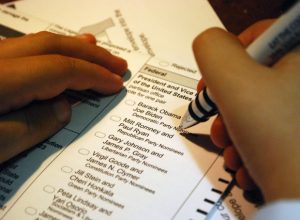Will Marijuana Help Elect Clinton?
In what has turned out to be a contentious and unusual election, Democrats are hoping they can edge out the Republican nominee in the White House bid with an issue that has gained a groundswell of support: Marijuana.
While the legalization of medical marijuana has gained a significant amount of bipartisan support, conservatives are less likely than liberals to support it and that gap is even greater when the topic is legalization of recreational marijuana.
Democrats are hoping that even if their top candidate doesn’t ignite voters, maybe the marijuana issue will. It’s true that in past presidential elections, “down-ballot races” – that is, those issues and offices that were farther down the ballot from the presidential nominee – have turned the tide in a number of key states. For example, the proposed same-sex marriage ban helped President George W. Bush snag reelection in 2004. And then in 2012, voters in Colorado were swayed to vote for President Barack Obama at the same time they voted to legalize recreational marijuana.
As it now stands, marijuana is on nine state ballots. Five of those states are voting on the issue of recreational legalization and four are voting on medicinal marijuana. Democrats are hoping these ballot measures will draw voters who might otherwise not come to the polls – voters who largely support Democrats. In fact, Colorado exit polls from 2012 indicated that support for the marijuana issue was so strong that the usual gender gap of greater female support for Obama was actually defied. It was the legalization vote that drew more young voters to the polls.
In 2014, young male voters in Florida flocked to the polls for a medical marijuana measure (which ultimately failed).
But some are skeptical the issue will have the same effect this year – in large part because support for legal marijuana is becoming more widespread across political lines. Numerous polls over the last 24 months have shown the majority of Americans – even those of older demographics (which tend to be more conservative) – support legal marijuana. Of people ages 35 to 49, nearly 65 percent are in favor of legalized cannabis. Among those between the ages of 50 and 64, nearly 60 percent were in support. And among younger voters – of both major political parties – support is widespread. Among young Republican voters, 63 percent support legalization.
Younger voters do tend to favor Clinton, but these ballot initiatives could draw voters of both political persuasions to the polls.
In Florida, one of the states with a pending medical marijuana vote, nearly 80 percent of voters overall support the measure. As political analysts note, that kind of figure isn’t possible without having support from each age, geographic, racial, age, gender and ethnic group.
Whereas gun laws and minimum wage proposals are far more partisan issues, medical marijuana is increasingly viewed universally in a positive light.
What we might see in states like Colorado and Arizona, traditionally more conservative states, is an edge for Democrats due to minimum wage increase proposals on the ballot this year. Particularly in minority communities, this issue is going to result in higher turnouts – which bodes well for the Democrats. Similarly, gun-related initiatives in Nevada, Maine, Washington and California could have a similar effect.
The Los Angeles CANNABIS LAW Group represents growers, dispensaries, collectives, patients and those facing marijuana charges. Call us at 949-375-4734.
Additional Resources:
Democrats Hope Marijuana Will Help Elect Hillary Clinton, Aug. 29, 2016, By Will Greenberg, Mother Jones
More Blog Entries:
Study: California Car Insurance Spikes $1,500/Year for Driving Under Influence of Marijuana, Aug. 26, 2016, L.A. Marijuana Attorney
 Cannabis Law Group's Medical Marijuana Legal Blog
Cannabis Law Group's Medical Marijuana Legal Blog




